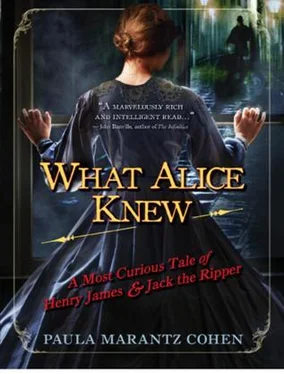“You must help me,” Jane Cobden repeated. “And him.”
“Him?” asked Alice, surprised.
“Walter Sickert. My brother-in-law.”
Alice, who was still holding the glass of laudanum in one hand, dropped it to the floor so that it shattered, but neither she nor William seemed to notice. They were both staring at the woman who had just spoken.
“I was with him last night, at the public house. I spent the night there; I left early in the morning. I know they’ve arrested him. I know you and your brothers have suspected him of those murders. But of course, he’s innocent of killing anyone, though not of other crimes, of which I hold myself more guilty than he. If he is an adulterer, I have betrayed my own sister. If Ellen knew…” She broke off and put her face in her hands.
Everything had suddenly changed. William had sprung from his chair and gone over to Jane Cobden. He raised her to her feet and began assuring her excitedly that he understood; flesh was weak, and sometimes even the most stalwart and upright tripped and fell. She could count on his discretion. He remembered her father and knew of her good works. He was in the counsel of the inspector on the case and would do his best to keep things quiet.
He had her write down a statement about what had happened, and after he put it in his pocket and saw her to the door, he returned and faced Alice. He did not hesitate to abase himself for his behavior. He had spoken rashly, said things that were unforgivable and cruel; yet he begged her to forgive him. He had been jealous—that was the crux of it, seeing his beloved sister so taken with a man known to be a libertine, though obviously a very talented and charming individual.
As he spoke, he appeared to Alice to have returned to his familiar, rational self. He was deferential, kind, articulate, yet she also recalled how he had sounded before Jane Cobden came in. He had said he was jealous of her affections; she believed him. She had often been jealous of him; why would he not be of her? But she also knew that there must be more that he was not revealing. He had gone mad for a time, and though the originating influence had dissipated, she could still sense the undertow pulling against his rational speech. She would never hear him speak again without a sense of that undertow. It existed, she knew, in everyone, but she had always thought of her brother as the most exemplary of beings, capable of keeping that side of himself at bay. Now she knew otherwise.
She would have to face what she should have known to be true all along: that on the stage that was her life, there were no other principal actors. She was entirely alone.
William was seated in Abberline’s shabby office, going through photographs of the murder scene. Sickert had been released upon delivery of the statement by Jane Cobden, and William and the inspector were back where they started: a vicious killer on the loose and no apparent suspects. The delivery of the gruesome specimen to Alice, which had initially seemed to William a sure indication of Sickert’s guilt, seemed now to have a different connotation. After all, it was widely known that William had been asked to consult on the case; a little digging by the cunning murderer would have revealed that he had family in London. What better way to mock his efforts than to terrorize his invalid sister?
Abberline returned to the office that afternoon and immediately began to study the details of the Kelly murder, poring over the photographs of the scene that had been delivered by the police photographer a few hours earlier.
“What’s the point of looking at photographs when we saw the room firsthand?” asked William.
“Because,” Abberline explained, “at the scene of a crime, it is impossible to see things in any perspective. The details overwhelm the whole, especially in a case as vicious and bloody as this one.”
William nodded, remembering his difficulty taking in the room when he had first arrived on the scene. He also recalled the tirade he had earlier directed at Abberline. Seating himself at the table where the photographs were spread, he gently touched his colleague’s shoulder. It was his way of apologizing. He sensed that Abberline understood that he had briefly gone mad and had now come back. There was no need to speak about it.
William saw at once the value of the photographs. They presented an entirely different view from what he had looked at that morning. At the time, his mind had moved in and out, from horror to a kind of reverie, incapable of engaging for any sustained period with the scene itself. The pictures, however, placed him squarely in a middle ground—at once more bearable and more horrible. He had felt it when he had looked at the photographs of the other victims. Here, the effect was amplified. He had the image, freshly imprinted on his memory, of the scene as it had actually existed; these pictures were a kind of overlay on that. He saw again, though more clearly now, the hollowed-out eyes, the pools of blood where the breasts had been, the carved-up torso, the bespattered room. The photograph eliminated color, texture, odor—all the distracting variables that had overwhelmed his senses. It provided instead a simple clinical representation: the body laid out, the head propped up, the left knee bent, and the tatters of nightdress showing here and there amid the blackness that designated the soaking blood. He was again struck by the paradox of what constitutes reality. The photograph was a representation, without color or dimension, much of the detail subsumed in darkness or blurred images, yet it made the scene available in its entirety in a way that being there could not.
He and Abberline stared together at the image of the eviscerated woman in the darkly shadowed bedroom. It was like peering through a keyhole into hell.
Two days after the murder of Mary Jane Kelly, Sickert appeared at the door of Alice’s bedroom holding Archie’s hand. The boy had let him in, and they had come up to the room quietly, “as a surprise,” Sickert had whispered, placing his finger to his mouth.
Alice, propped up in bed writing in her journal, looked up over her spectacles as though her visitor’s presence were the most normal thing in the world.
“Our young man informed me that you were awake,” said Sickert jauntily, “so I told him that we should sneak up on you. But you do not seem surprised.”
“Do you want me to be surprised?” she asked, returning automatically to the teasing tone that she had been used to taking with him. So much had happened in the interval, and yet at the sight of him, it all seemed to melt away.
“I don’t know if I want you to be surprised,” said Sickert, “or to be so anticipating my visit that you are not. Since you’re not, I’ll assume the latter.”
“You look well,” said Alice.
“I’ve had a hard few days, but I’m recovered.”
“And how was Cornwall?”
He held her eyes for a moment. “Oh, I didn’t go as planned. Something came up. But I’ll be leaving tonight; this time it’s certain. Still, I wanted to drop this off before I left.” He held up the canvas, its back facing to her. “I promised to hang it on the wall for a proper viewing, and I try to keep my promises, when I can.”
Without further explanation, he took out a hammer from his satchel and a nail from his pocket and strode over to the wall opposite the bed. He stood back a moment to establish the position and then hammered in the nail. “Now, close your eyes,” he said.
“I recall your telling me to do that once before,” said Alice, complying. “You said it would relax my face.”
“And it did. As you’ll see. Now open.”
Читать дальше












